Gone Home devs on player agency: "We all appreciate games that trust us as players."
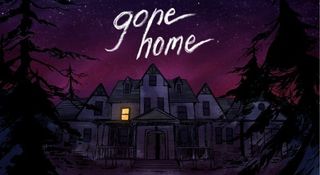
I shared Tom's fascination with Gone Home when I had a chance to play it earlier this month. It's relatable, contemporary, comfortable like your dad's sweatshirt, and you get to sift through the drawers and closets of your in-game family to unravel the question “Why is no one home?”
During that demo, I spoke with The Fullbright Company co-founders Steve Gaynor and Johnnemann Nordhagen about how they approach designing a game driven by player curiosity, and where clues and story elements can be found achronologically.
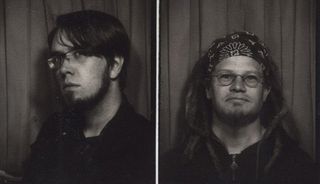
PCG: I think the thing that strikes me most is, as the creators of a game that's telling a story through a process of unguided discovery, it seems like you're placing a lot of trust in the player. Does creating this type of game take a lot of restraint?
Steve Gaynor: Yeah… Karla and Johnnemann and I all worked on the BioShock series, and those games, by default, give a lot of guidance and help to the player. But they also are structured in such a way that the player also has to do more of the work on their own. Each level is an open structure level. It's not just a linear corridor. You are expected to check your map and explore side areas and all that kind of stuff. So for us, we're making a game that has a very similar spatial structure. Go to a place and you can go upstairs or downstairs or whichever room you want in whichever order you want. You can check your map if you get lost and everything. But because we don't have quest objectives or levels to clear, bosses to beat, any of that stuff… Since the experience is very focused just on one aspect of the stuff we worked on, which is just the exploration and finding the story and being in the place… It gives us the ability to go hands-off with the player. We can say, “This is a place for you to explore if you want to. You'll find things in the environment that might hint towards going here next or doing this next.” But we all appreciate games that trust us as players to be capable of expressing our agency in the game world and not hold our hands through it. We want to be able to support that in Gone Home. We're lucky to have a game that… It's more possible to do that… In some sets of circumstances, if somebody gets lost, then you can't make it past the next step. In Gone Home, if you don't know what part of the house you're in right now, you can check and be like, “Oh, maybe I should go check that area out.” It's up to the player to decide how they want to interact with the space on that level.
Johnnemann Nordhagen: I think there's really no possible way to have… The very notion of an exploration-based game is at odds with the idea of leading the player around. It's not exploration if you're led to it by the nose. That's almost the only way that this kind of game can be done.
Gaynor: In some cases, pointing the player towards where they're supposed to go next can encourage exploration in other ways. I turned the quest arrow off when I played BioShock. But people who I know who played it just by default, they would use the quest arrow to tell them where not to go until they had explored everything else. I think that giving the player more information doesn't necessarily short-circuit the feeling of being able to explore the way that you want to. But, that said, we wanted to have as little of a meta-presence as possible. We didn't want to have someone telling you, “Now go here, now go there.” There are hints that say, “I saw that you got through some of the secret passage stuff.” “I found this note that talks about secret passages. I would like to go there next.” But nobody's saying you have to.
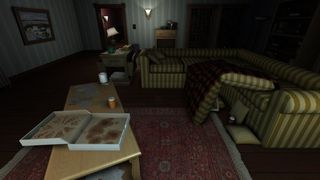
Did it take you some time during development to figure out the middle ground or the right spot for that amount of directedness? Did you begin with more and end up with less, or begin with less and end up with more?
PC Gamer Newsletter
Sign up to get the best content of the week, and great gaming deals, as picked by the editors.
Gaynor: We definitely ended up more hands-on and backed off of it. It's one of the things that's very important about playtesting. We started out and there was… You saw that there are some locked doors in the game, right? Like the basement and the attic and the east wing of the house are locked. Earlier we had a lot more of that. It was just a way to structure the progression through the house. It was us being over-cautious, like “We don't want anybody to get things out of order. We'll say you have to unlock this, then find the key to that, then find the key to that, so that you never do it wrong.” People played it and everybody was like, “Feels really game-ey to have to find all these keys. Why don't you just let me go upstairs if I want to?” They were right. We re-evaluated and we thought… Basically, physically locking something off is a last resort. It's only if there's really something that doesn't make sense if you get it out of order. If it gets you off the rails. There's the diaries that are about the first show, the rock show that she goes to and that night. If you got those backwards, that just feels weird. They're so chronologically tied together. But I assume… You tell me. Did you explore downstairs or upstairs first?
I went to the left. That's the west, I guess.
Gaynor: So you went through that space and you found the story in chronological order. The upstairs is totally open, though. You can go up there. If somebody says, “I'm in the foyer. That stairwell is spotlit and there's an open door at the top. I'm going to check it out,” you start more in the middle of Sam and Lonnie's story, when they start hanging out. You find all the stuff that's upstairs, and when you end up back downstairs, you're filling in the backstory and finding out how the story got to that point. Which, for us, it's basically just like… Any progression the player might have in the game needs to be valid. Getting those two chunks of story out of order is still a totally valid experience. In a lot of ways it's actually more interesting. It definitely encouraged us to be more hands-off and say, “You know what? If we think we need to have six keys, we really need to have one key.”
Nordhagen: One thing that we are doing right now is giving an option called a modifier on starting a new game. That lets the player… It's a non-standard play experience. It's not the way the game is designed to work or anything like that. But it essentially unlocks all the doors in the house so you don't need to even be constrained in the few ways that we have chosen to constrain the player. That's for people who don't want the standard experience, but might want to experience the game in a different way.
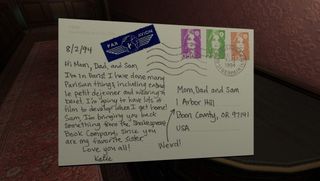
Gaynor: Yeah. For people we think of as exploration purists. We're not calling out the modifier options. If you dig into the options screen on the start menu you can find it. It's just a list of things you can turn on and off. You heard the audio diaries throughout. That is a meta-thing. We don't explain where they're coming from in this part of the game. We have keys that are basically set up to make sure that that story spine is in basically chronological order. But for a player that says, “The experience I really want is just a simulation of if I was in this house, and I could just explore it and find what's in there, and that's all…” Modifiers are basically there to support different levels of that experience. It's not like a New Game+ thing. It's not like you have to finish the game our way first and then do this. But if you want to go into the options -- and you know what you're getting yourself into, because it's all labeled – you can unlock all the doors. You can disable audio diaries so you only find the physical artifacts and put the pieces together yourself. Obviously the core experience we're making is what we handed to you. It's just that if you hit New Game… The main driver of the story is Samantha's story. You're hearing her voice and you're going in a basic structural order that we have set out. But because, relatively speaking, there are not a ton of moving parts, mechanically, in our game, we don't feel like there's any reason not to empower the player to say, “I want to have this kind of experience within the premise that's been built here.” If we can support it.
How do you foster curiosity in a game like this? That's the primary feeling I was having as I was playing, and some amusement with the '90s posters, the '90s ephemera that you encounter, which was delightful… It seems appropriate that you guys are in Portland.
Gaynor: Keeping the dream alive.
Yeah, haha.
Gaynor: But yeah, some of it is just getting the player off on the right foot, both tonally, through A/V stuff… The middle of the night, dark and stormy night, that kind of thing. Dramatic lighting. Everything that makes you feel like you're in a mysterious place. Then the other side of it is stuff like the note that's tacked to the front door. This note has been left for you, and it's kind of ominous, but it's kind of inviting you to find out what's happened here. Something is clearly not right. Those kinds of things color the rest of the experience that you go through. It puts you in the mindset that there's something worth discovering here. Every little piece that you find, even if it's not immediately obviously relevant to unraveling the mystery… You're looking for how it might be relevant. You might find something that seems innocuous when you first discover it, and then you learn more later and realize, “That thing I read before, that's what they were talking about.” I think that we are entering into a contract with the player. A lot of stuff in Gone Home is readable, or you can pick it up and examine it and it has relevant information on it. We're basically signing up for the player to trust us that anything they might find could have relevance. There's obviously Kleenex boxes and hand soap and stuff that you can pick up if you want, but if there's a note that you can read, it's going to be worth reading. If there's a family photo that you can examine, it's going to have some impact on your understanding of this place or the people who lived here or what happened in their lives or where they might be right now. As long as we can maintain… As long as we never allow the player to get to the point where they think, “I'm exploring and picking stuff up and I don't know why that matters…” As long as we can keep you saying, “Okay, the next thing I find, that will be important too. I'll get some kind of greater understanding from it,” hopefully you want to keep going forward and keep building up what you know about this place.
Nordhagen: Players will enter into any game with a natural level of curiosity. They want to explore the world. They want to discover what is going on there, what the rules of the space are and what the narrative is. They want to discover things about their character.
Gaynor: It's both a mechanical and… Your first question, when you load into a game, is “What can I do?”
Nordhagen: Right, exactly. As long as you don't stifle that, I feel like you can feed into that curiosity. It starts as a spark and you can feed it things that make it grow.
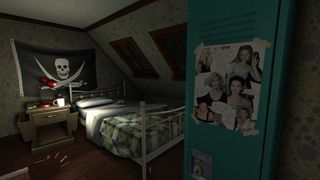
Gaynor: I feel like in a lot of cases, heavy tutorialization works against that initial investment in finding out about what your role is in the world and what you can do and what the possibilities are. You start from a point of endless possibilities, right? You start a game and you don't know what the possibility space is. You think, “What can I do? What's gonna happen? Where could this go?” Each time the game says, “And now jump through the hoop. And now duck. And now…” And so on. You think, “The possibilities are narrowing. They'll just tell me what I'll have to do.” We have prompts that go up that just tell you what the functions of the buttons are, so you know what abilities you have as far as accessing your map and zooming in on stuff. But beyond the point of just giving you the tools to be able to interact with the world, I think that backing away and just saying, “Now you know what you can do, go to it” leaves that sense of possibility open to the player. They want to keep finding out about what could fill it, instead of it being tamped down.
Certainly. It was comforting to be in a mindset where I wasn't concerned with consuming all the content I could as fast as I could.
Gaynor: Which is interesting, because in a lot of ways, your real meaningful role as a player in the game is to find and consume content. We aren't a game that has highly dynamic emergent systems or anything. You are finding stuff and then reading it or examining it and understanding it, then you put it down and move on. In a lot of ways you're going through and just consuming content. But I feel like the difference is that, in Gone Home, you're in charge of that. Anything you find, you have chosen to find. Any room that you go into, you've chosen to go into. You're not encouraged to speed run, to slam through the content and crank up the firehose as fast as possible, because at every point that you find something, it's a new decision point for you, essentially. “Alright, found this. What do I go look for next?” Then you say, “I'm going over to that cabinet to see what's in there.” Despite the fact that you are being a consumer of information by exploring this space, hopefully it feels like a legitimate experience of you making a bunch of decisions about how you are going to exist in this world, and not just eating handfuls of candy, you know? It's an interesting dynamic that you raise. I'm glad that you felt like it was not just a purely gluttonous experience…
I feel like part of that's related to the absence of feedback in almost all cases. I think there was only one instance that I heard an audio cue to express something's meaning or significance. That was the secret hallway, I think?
Gaynor: Yes. There's a few subtle music stings. When you find the map pieces that tell you where that stuff is, there's also a bit of “doo da doo…” We pop up a prompt that basically tells you that your meta-map has been updated with that information, because you wouldn't necessarily know that otherwise. But yeah, we're totally hands-off except for that stuff.
The Fullbright Company expects Gone Home to release sometime in the second half of 2013. Check out Tom's preview .

Evan's a hardcore FPS enthusiast who joined PC Gamer in 2008. After an era spent publishing reviews, news, and cover features, he now oversees editorial operations for PC Gamer worldwide, including setting policy, training, and editing stories written by the wider team. His most-played FPSes are CS:GO, Team Fortress 2, Team Fortress Classic, Rainbow Six Siege, and Arma 2. His first multiplayer FPS was Quake 2, played on serial LAN in his uncle's basement, the ideal conditions for instilling a lifelong fondness for fragging. Evan also leads production of the PC Gaming Show, the annual E3 showcase event dedicated to PC gaming.
Most Popular







